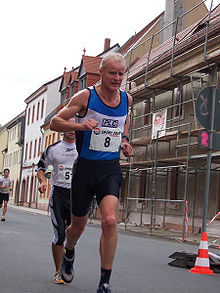- Olaf Beyer
-
Olaf Beyer (born August 4, 1957 in Grimma) was an East German 800 metres runner who won the gold medal at the 1978 European Championships in Prague. In that race he beat the future world-record holder Sebastian Coe and the future Olympic Champion Steve Ovett both from the UK. Beyer's time of 1:43.84 made him temporarily the fourth-fastest 800m runner of all time. Beyer himself explained to the British sports journalist and writer Pat Butcher that he won that surprising championship because for the first and only time in his career, he had been able to train for the previous year free from injuries. He also ran intelligently, not taking the lead until the final tens of metres, but at the same time following Coe and Ovett closely. Ultimately, in Beyer's opinion, he was in a good shape that day and could thus defeat even Ovett, who was known as a sharp kicker (see Pat Butcher, The Perfect Distance: Ovett&Coe: The Record-Breaking Rivalry, London: Weidenfeld&Nicolson, 2004).
In the 1978 European Athletics Championships, he also participated in 1,500 metres where he placed ninth (see, for example, "European Championships Prague" / EM-Praha, Tapio Pekola et al., eds., Kaarina, Finland: "Runner" / Juoksija magazine, 1978). After 1978, he continued his competitive running career until at least 1982, but he never won a major international championship again. In the 1980 Moscow Olympics, he was surprisingly eliminated in the 800-metre semifinals, and he placed seventh in the 1982 European Athletics Championships 800-metre final (see, for example, "The Moscow Olympic Book" / Moskovan Olympiakirja, Tapio Pekola et al., eds., Helsinki, Finland: "Runner" / Juoksija magazine, 1980; Markku Siukonen and Matti Ahola, eds., "The Great European Championships Book" / Suuri EM-kirja, Jyväskylä, Finland: Sports Publications Ltd. / Sportti-Kustannus Oy, 1990).
References
European Champions in Men's 800 m 1934: Miklós Szabó (HUN) • 1938: Rudolf Harbig (GER) • 1946: Rune Gustafsson (SWE) • 1950: John Parlett (GBR) • 1954: Lajos Szentgáli (HUN) • 1958: Michael Rawson (GBR) • 1962: Manfred Matuschewski (GDR) • 1966: Manfred Matuschewski (GDR) • 1969: Dieter Fromm (GDR) • 1971: Yevgeniy Arzhanov (URS) • 1974: Luciano Sušanj (YUG) • 1978: Olaf Beyer (GDR) • 1982: Hans-Peter Ferner (FRG) • 1986: Sebastian Coe (GBR) • 1990: Tom McKean (GBR) • 1994: Andrea Benvenuti (ITA) • 1998: Nils Schumann (GER) • 2002: Wilson Kipketer (DEN) • 2006: Bram Som (NED) • 2010: Marcin Lewandowski (POL)
World Best Year Performance in Men's 800 m 1970: Ken Swenson (USA) • 1971: Dicky Broberg (RSA) • 1972: Dave Wottle (USA) • 1973: Marcello Fiasconaro (ITA) • 1974: Rick Wohlhuter (USA) • 1975: Mike Boit (KEN) • 1976 – 1977: Alberto Juantorena (CUB) • 1978: Olaf Beyer (GDR) • 1979: Sebastian Coe (GBR) • 1980: Donald Paige (USA) • 1981: Sebastian Coe (GBR) • 1982 – 1983: Steve Cram (GBR) • 1984 – 1985: Joaquim Cruz (BRA) • 1986: Steve Cram (GBR) • 1987: Billy Konchellah (KEN) • 1988: Johnny Gray (USA) • 1989: Paul Ereng (KEN) • 1990: Peter Elliott (GBR) • 1991: José Luíz Barbosa (BRA) • 1992: Johnny Gray (USA) • 1993: Nixon Kiprotich (KEN) • 1994: Benson Koech (KEN) • 1995 – 1997: Wilson Kipketer (DEN) • 1998: Japheth Kimutai (KEN) • 1999: Wilson Kipketer (DEN) • 2000: André Bucher (SUI) • 2001: Yuriy Borzakovskiy (RUS) • 2002: Wilson Kipketer (DEN) • 2003 – 2005: Wilfred Bungei (KEN) • 2006 – 2007: Mbulaeni Mulaudzi (RSA) • 2008: Abubaker Kaki Khamis (SUD) • 2009 – 2010: David Lekuta Rudisha (KEN)
Categories:- East German athletes
- German middle distance runners
- 1957 births
- Living people
- Athletes (track and field) at the 1980 Summer Olympics
- Olympic athletes of East Germany
- People from Grimma
- German athletics biography stubs
Wikimedia Foundation. 2010.

